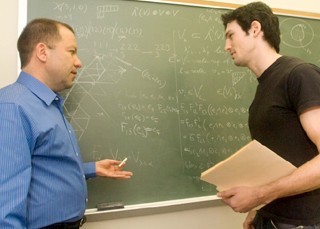Doing the Math -- Cristian Lenart's Quest for Simplicity
 |
Associate professor Cristian Lenart and doctoral student Arthur Lubovsky view mathematics as the perfect vehicle to simplify some of the world's most complex problems, from the human genome to unlocking the mysteries of evolution. (Photo Mark Schmidt) |
Cristian Lenart is driven to make complex issues easy to understand. While he readily admits that his field, mathematics, doesn't explain the entire world, he's not willing to concede that it won't, someday.
The associate professor studies algebraic combinatorics, which involves simple structures that display discrete, or countable, elements created to break down the larger intricacies and structures of geometry, physics, algebra, statistics, and computer science.
"We take a complicated object, say a geometric phenomenon, and create a simple model -- not a miniature representation, but structures with representative components that can be more easily manipulated to gain a better understanding of it," says Lenart.
Armed with these discrete structures, or "games," Lenart and his students program computers to test theorems, often using shared software created by their own discoveries.
"All mathematics roughly can be classified as continuous or discrete," says Arthur Lubovsky, a doctoral student from Ukraine via Brooklyn who studies with Lenart. "Think of a graph or a line as you draw it -- it's continuous as long as the pencil stays on the paper, but the moment you lift the pencil it becomes discrete, and measurable in a different way."
In biology, physics, and chemistry, Lenart and Lubovsky see practical applications of combinatorics. It's simple, Lenart says -- a discrete model can be programmed on a computer much easier than, say, a genome sequence. As Lenart explains it, every study of genomes involves solving a combinatorial puzzle to find the rearrangements that transform one genome into another. The goal is to reconstruct these rearrangements for biologists, revealing our ancient genome achitecture and possible keys to evolution.
It's a fact that has had the attention of the National Science Foundation, which, in a nod to Lenart's work, has continuously funded his research since 2004; his first grant of $107,000 was followed in 2007 by $112,000.
"It's definitely great recognition for the work," Lubovsky says. "It's a privilege to be funded."
"We're always striving for the simple," Lenart says. "You know, a lot of mathematicians still use pencil and paper."
![]() For more news, subscribe to UAlbany's RSS headline feeds
For more news, subscribe to UAlbany's RSS headline feeds


